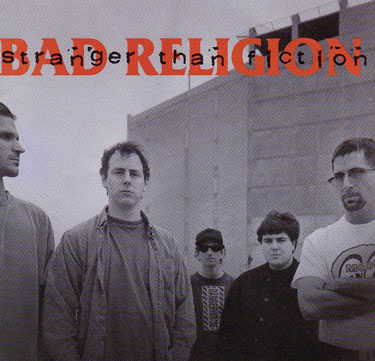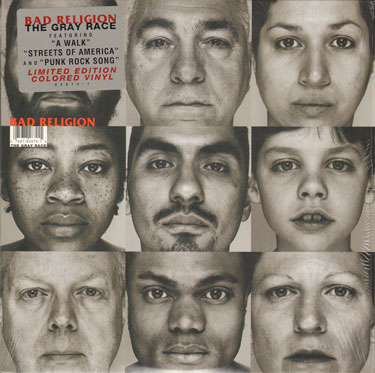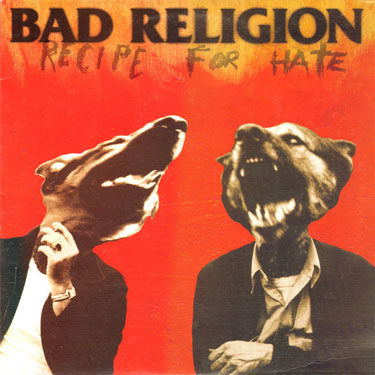BAD RELIGION

Schayer seen second from left
Bobby Schayer interview
by Peter Crigler
(August 2021)
When punk broke again in the '90's, Bad Religion finally had their chance in the sun. One of the preeminent punk bands of the first wave of hardcore in the '80's, the band had already proved themselves as lifers by the time Atlantic Records came calling in 1993. Riding the wave of punk's resurgence, the band became more popular than ever and allowed a new, younger audience to discover what longtime fans had known forever. Bobby Schayer was their drummer from 1991 to 2001 and he recounted all the highs and the lows of the band's second decade of popularity.
PSF: When did you get interested in playing drums?
BS: Probably around 1972. My oldest brother was playing bass in a local band at the time and they rehearsed in an old shed above his garage at the back of his house. One day after school he took me up there to check out the equipment they were using and the first thing I spotted in the corner was the drum kit. It belonged to a guy named Terry Rae who was once a member of The Flamin' Groovies and The Palace Guard.
I was allowed to play the kit for less than five minutes but I knew exactly what I wanted to do. It was a great starting point.
PSF: What were you up to prior joining the band?
BS: I was living in the San Fernando Valley and working at A&M Records in Hollywood.
PSF: How did you end up in the band and what was your initiation like?
BS: Well, to make a short story long, it was in late March of '91. One day, I'd just come home from work and there was a message on my answering machine from Greg Hetson, asking me If I'd be interested in trying out for Bad Religion as their new drummer. I got back to him right away to see what was up. He explained to me that their old drummer Peter Finestone had suddenly quit the band, they were about to make a new record, US and European tour dates were booked, and they needed someone to fill the spot pretty quickly. Of course, I said yes and asked him when and where? Greg stopped by my house the next day with a tape of How Could Hell Be Any Worse and Suffer. I asked him what to learn and what not to learn. He gave me the rundown and wished me luck! I had about three days to learn the stuff, which I did on guitar first, drums second. 😀 This way I knew all the verses and choruses and I'd be ahead of the game.
Well, forward to 72 hours later and I found myself at Uncle Rehearsal Studio in Van Nuys, a little nervous but a little excited too. The moment I walk through the door I meet Jay Bentley, Brett Gurewitz, and Colin Sears from Dag Nasty, who had just finished auditioning on drums as well. After our introductions, I walk into the practice room to see Greg Hetson auditioning Nicky Beat from The Weirdos and The Germs. It was pretty surreal to say the least, because here I am about to try out for a band that I first saw in 1981, but also here's one of my favorite punk drummers of all-time gunning for the same gig. OUCH!!!
An hour later and it's finally my turn in the driver's seat, but unfortunately Brett Gurewitz leaves the studio to head back to work for the rest of the day. Only Jay and Greg remain, as well as Nicky Beat and Fletcher Dragge from Pennywise. The first thing they ask me is, "What songs do you know?" I tell them, "All of them," to which they reply "yeah right," haha.
I tell them I'll just call them out and we'll go from there and we're off...
We start with "Do What You Want" from Suffer and end with the Bad Religion theme song 30 minutes and about 20 songs later.
At this point we're all like, "Damn that was fun, but it's 4:30 and it's been a long day. As soon as we know we'll let you know." I was pretty happy with the way the audition turned out but I was much happier that I actually got the chance to play these songs with the two guys who recorded them.
Oh well, whatever happens happens. Well, 40 minutes later there's a message on my answering machine from Greg Hetson again. He wants to know if I could come back tomorrow and play the songs again with Brett this time? See ya tomorrow!
This time we only play about six or seven songs and Brett asks me, "Do you play chess?" To which I reply, "Yes but not very good," and he says, "Okay you're in the band now." April 1,1991 - No joke! 😀

PSF: What was the process like making Generator, and what caused the album's delay?
BS: I was 24 years old at the time and it was all new to me, to be honest. It's still my favorite Bad Religion record that I actually played on. It took about four days to get the basic tracks recorded and maybe another four days for vocals and backgrounds to the best of my knowledge. We'd learn the songs pretty much on the spot, write out the notes and changes, work it out the best we could, and push the record button.
What probably caused the delay of the record was Against the Grain had just been released at the time, as well as [the compilation] 80-85 that coming fall. That's just my guess.
PSF: Was there any difference when it came to making Recipe for Hate?
BS: Well, the only difference is that we'd record two songs a day and have them completed by the end of the day. All basics, rhythm and leads as well as most of the vocals.
It was pretty enjoyable experience and I really liked Paul DuGre as a producer.
PSF: What caused the band to move to Atlantic and how did everyone feel about it?
BS: It was mainly for distribution purposes. I'm sure there was some apprehension about the switch from Epitaph but I have no regrets.
PSF: What brought about Brett's departure and was that a tough time for the band?
BS: Well pretty much the success of The Offspring's Smash made Epitaph a household name, but it also made it impossible for Brett to tour. He just couldn't commit himself to the band at the time and it was a total bummer, especially for Greg Graffin. Greg and Brett were the main songwriters and it was always exciting to see what each of them would bring to the table, but when Brett left, I'm sure the pressure must've been horrible for Greg. It was a tough time for all of us but we also figured out at that point that we've come this far so why not continue? Plus we'd just finished recording Stranger Than Fiction a couple months earlier. Calling it quits wouldn't have been the best decision. There was a lot of work to be done so we decided it was time to move forward and find a replacement.
PSF: What was it like bringing in Brian and did that affect the band in any way?
BS: Brian was a great replacement after Brett. I loved having Brian in the band and I was totally honored to work with him. He was and still is an incredible guitar player and his contribution to the band is immense.
PSF: Where do you think the band fit in with the '90's punk explosion?
BS: I remember back in the '90s doing an interview with this fanzine that tried to compare '90s punk bands like Green Day to the Beatles and the Offspring to the Rolling Stones. When the question came to Bad Religion and who would I compare them to I just laughed and the only answer I could come up with was the Kinks. When the interviewer asked me why, I said because we were the band everybody seem to like but we were a little too to nondescript to fit in. I still love the Kinks.

PSF: What was it like working with Todd Rundgren and Ric Ocasek?
BS: Pretty amazing to be honest. Here's two guys whose records I actually grew up listening to when I was a kid and the next minute, I'm working with them. I'm still in awe.
PSF: What was success like and how did everyone react to it?
BS: Success was that I had a job and I'm sure everyone felt the same way.
PSF: Were you surprised by the reaction to No Substance?
BS: Not really! Believe it or not, there's a few songs off that record that I actually really like, but I knew hardcore Bad Religion fans wouldn't get it.
PSF: What ultimately caused your departure from the band and was it difficult?
BS: A sore shoulder and overall burnout. I actually found it pretty easy after I left the band because I accomplished everything I ever wanted being a musician.
PSF: What are you up to now?
BS: I still work in music but not performing.
PSF: Do you keep in touch with any of the guys?
BS: Not for a long time. I've only seen the band once since my departure back in 2001. Now that I'm back in L.A. I hope to change that soon.
PSF: What do you think of the impact of alternative rock in the '90s?
BS: I enjoy it.
PSF: What do you hope BR's legacy will be?
BS: Another 40 years. 😀